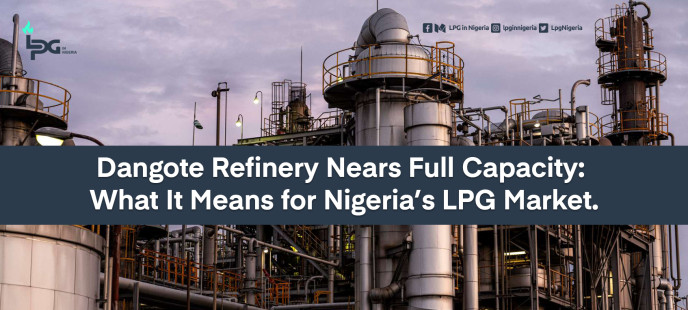- 3883
- 0
Sharing Ideas and Updates on LPG in Nigeria and related information to enable effective collaboration within the LPG Value Chain
Dangote Refinery Nears Full Capacity: What It Means For Nigeria’s LPG Market

Nigeria’s 650,000 b/d Dangote Refinery is set to hit full operational capacity in April, marking a major milestone for the country’s refining industry. With its alkylation unit now coming online, the refinery will soon be able to run its crude distillation unit (CDU) at its full 550,000 b/d capacity. This development is expected to reshape Nigeria’s fuel supply landscape—but what does it mean for the Liquefied Petroleum Gas (LPG) market?
Will Dangote Use LPG as Feedstock?
One key aspect of the refinery’s operation is its alkylation unit, which produces high-octane alkylate used in gasoline blending. Alkylation processes often rely on isobutane, a key component of LPG, as feedstock. If Dangote integrates LPG into its refining process, this could have significant implications for the domestic LPG market.
Here’s what could happen:
Increased LPG Demand for Refining
If Dangote uses LPG (specifically isobutane) for alkylation, demand for LPG could rise, creating new market opportunities for local suppliers. This could also push up domestic LPG prices, depending on the refinery’s sourcing strategy.
Potential Shift in LPG Supply for Cooking and Autogas
A surge in LPG demand from the refinery might tighten the availability of LPG for domestic use, particularly for cooking and autogas conversion. However, this depends on whether the refinery sources LPG locally or relies on imports.
Improved Local Production and Reduced Imports
On the flip side, if Dangote begins producing LPG as a byproduct, it could reduce Nigeria’s dependence on imported LPG, improving energy security and stabilizing prices. Given that Nigeria still imports a large portion of its LPG needs, this could be a game-changer.
The Bigger Picture: Dangote’s Role in Nigeria’s Energy Transition
With Nigeria pushing for LPG adoption in households, industries, and transportation (autogas), Dangote’s refining strategy could either accelerate or disrupt these efforts. If more LPG is directed toward refining instead of domestic consumption, supply dynamics could shift, impacting prices and availability.
However, if the refinery boosts local LPG production, it could help drive down costs and increase supply for both domestic and industrial users. This aligns with the government’s Decade of Gas initiative, which aims to expand gas utilization across sectors.
A Market in Transition
Dangote Refinery’s full-scale operations will reshape Nigeria’s fuel market, and the LPG sector will not be left out. Whether LPG prices rise or fall will depend on how much LPG the refinery consumes versus how much it produces. As the refinery ramps up, all eyes will be on its impact on Nigeria’s energy ecosystem—especially in the rapidly evolving LPG market.
Source: Argus - George Maher-Bonnett
















0 Comment.